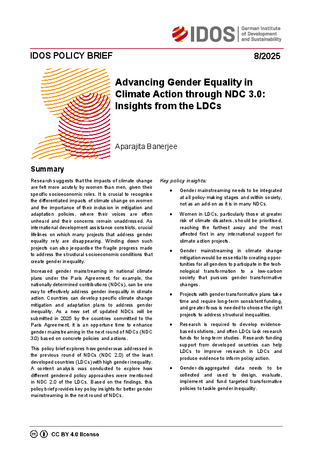Advancing gender equality in climate action through NDC 3.0: insights from the LDCs
Banerjee, AparajitaPolicy Brief (8/2025)
Bonn: German Institute of Development and Sustainability (IDOS)
DOI: https://doi.org/10.23661/ipb8.2025
Research suggests that the impacts of climate change are felt more acutely by women than men, given their specific socioeconomic roles. It is crucial to recognise the differentiated impacts of climate change on women and the importance of their inclusion in mitigation and adaptation policies, where their voices are often unheard and their concerns remain unaddressed. As international development assistance constricts, crucial lifelines on which many projects that address gender equality rely are disappearing. Winding down such projects can also jeopardise the fragile progress made to address the structural socioeconomic conditions that create gender inequality.
Increased gender mainstreaming in national climate plans under the Paris Agreement, for example, the nationally determined contributions (NDCs), can be one way to effectively address gender inequality in climate action. Countries can develop specific climate change mitigation and adaptation plans to address gender inequality. As a new set of updated NDCs will be submitted in 2025 by the countries committed to the Paris Agreement, it is an opportune time to enhance gender mainstreaming in the next round of NDCs (NDC 3.0) based on concrete policies and actions. This policy brief explores how gender was addressed in the previous round of NDCs (NDC 2.0) of the least developed countries (LDCs) with high gender inequality. A content analysis was conducted to explore how different gendered policy approaches were mentioned in NDC 2.0 of the LDCs. Based on the findings, this policy brief provides key policy insights for better gender mainstreaming in the next round of NDCs.
Key policy insights:
• Gender mainstreaming needs to be integrated at all policy-making stages and within society, not as an add-on as it is in many NDCs.
• Women in LDCs, particularly those at greater risk of climate disasters, should be prioritised, reaching the farthest away and the most affected first in any international support for climate action projects.
• Gender mainstreaming in climate change mitigation would be essential to creating oppor-tunities for all genders to participate in the tech-nological transformation to a low-carbon society that pursues gender transformative changes.
• Projects with gender transformative plans take time and require long-term consistent funding, and greater focus is needed to choose the right projects to address structural inequalities.
• Research is required to develop evidence-based solutions, and often LDCs lack research funds for long-term studies. Research funding support from developed countries can help LDCs to improve research in LDCs and produce evidence to inform policy action.
• Gender-disaggregated data needs to be collected and used to design, evaluate, implement and fund targeted transformative policies to tackle gender inequality.

